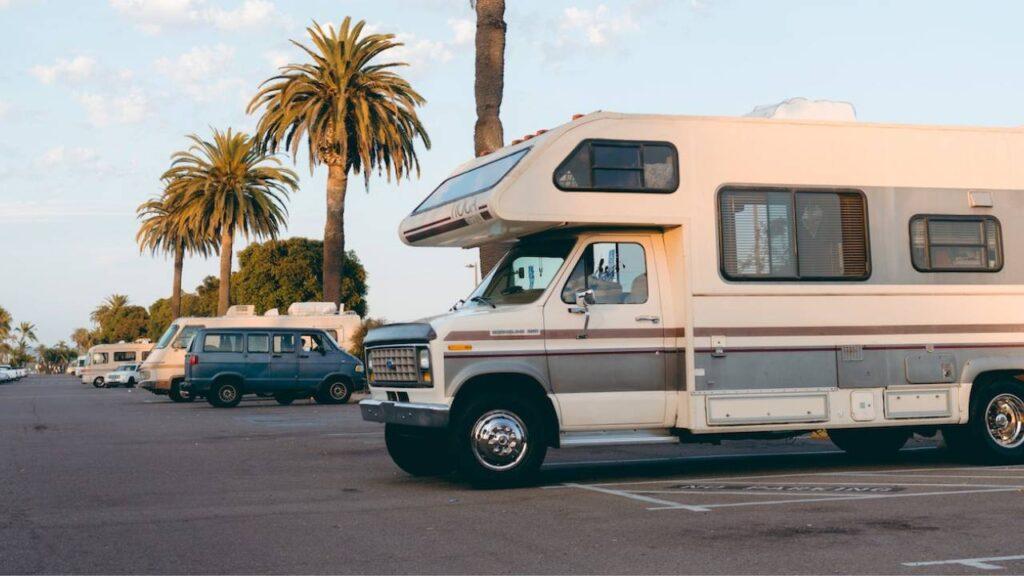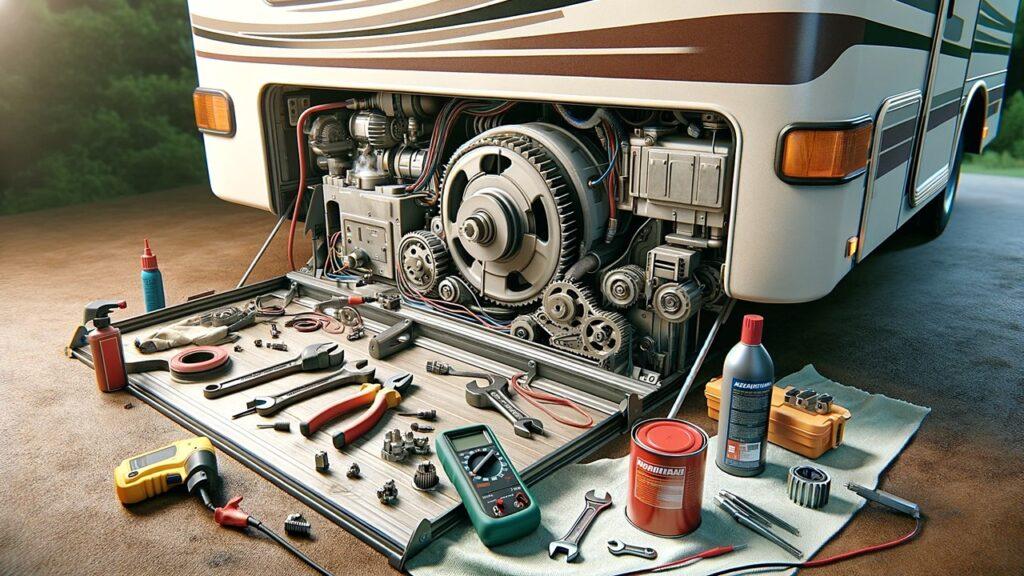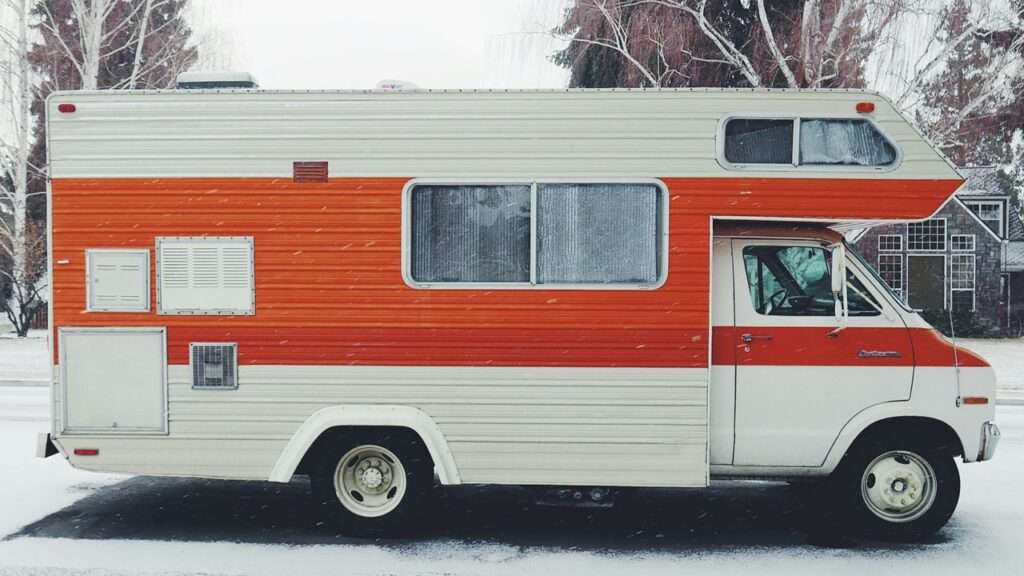
Getting electricity while living van life usually comes from solar panels, batteries, or charging while you drive. Some people use generators or plug into power at campgrounds. The right setup depends on your needs and how often you’re off-grid.
This article explains the main ways to power your van. You’ll learn about solar systems, battery setups, and other simple ways to keep your lights, fridge, and devices running while living on the road.
1. Understanding the Basics of Van Life in the USA
The USA, with its rich tapestry of landscapes, offers a unique playground for van lifers. But to understand the power needs, one must first grasp the vastness of the American van life landscape.
- Coast to Coast Journeys: As you traverse from the Pacific waves crashing against California’s cliffs to the sunrise over Maine’s rugged coastline, the climate shifts dramatically. A balmy beach day on the West Coast might mean solar panels reap energy in abundance, while a chilly evening up North might necessitate a electric heater, propane heater or a diesel heater and a electric heated blanket, drawing on stored power.
- The Call of Iconic Routes: Imagine traversing Route 66, a historic path stretching over 2,000 miles. The sun-drenched highways of Arizona and the rainy vistas of Missouri both offer different power challenges and opportunities.
- Seasonal Power Dynamics: Seasons play a pivotal role in van life USA. Winter, with shorter days, means less sunlight for solar harvesting, while summer, with its longer days but increased appliance use like fans or ACs, has its own energy dynamics.
2. Powering Different Types of Vehicles
Picture this: the sun setting on the horizon, your favorite song playing, and the open road inviting you to chase adventures. Whether you’re in the nostalgia-inducing VW bus or the sprawling luxury of a Class A RV, ensuring you don’t run out of power halfway is the real deal. Because let’s be honest, the journey’s mood can quickly go south if you suddenly can’t brew your morning coffee or charge your devices. So, let’s dive deep into the electric heartbeat of these vehicles, from campervans to minivans, and discover how to keep their energy vibes high.
Campervans
- Conversion specifics and power considerations: So, you’ve poured your soul into customizing your campervan, making it an extension of you. But remember, every added fairy light or that fancy espresso machine has its own power appetite. Make sure you’re ready for it.
- The charm of the VW bus and its power demands: Cruising in a VW bus, with its retro vibes, is all fun and games until you realize it’s a tad thirsty for power. But don’t worry; with a little tweak here and there, your vintage beauty will be humming along just fine.
RVs (Recreational Vehicles)
- Differences in power needs among Class A, B, C, and towable RVs: Think of RVs as apartments-on-wheels. From cozy studio-sized Class B’s to penthouse-like Class A’s, their electric hunger varies. Make sure you know what’s cooking under the hood.
- The benefits of park models and staying at RV parks: Imagine pulling up to an RV park and plugging into a world of convenience. Especially if you’re in a park model, it’s like plugging into a good night’s sleep – simple, refreshing, and hassle-free.
Minivans
- The allure of discreet van life and power conservation: Minivans are the undercover agents of van life – discreet yet always on a mission. While they don’t crave much power, it’s all about balancing stealth with life’s little comforts.
- Ensuring gas efficiency while maintaining comfort: Riding a minivan, especially on iconic stretches like Route 66, is about savoring every moment. But remember, every blast of AC or hour of device charging counts. It’s a tango between enjoying the breeze and ensuring you have enough juice for tomorrow’s journey.
Life on the road, in essence, is about freedom, stories, and those perfect sunsets. But underpinning those Instagrammable moments is your vehicle’s energy vibe. Whether you’re customizing a campervan, living it large in an RV, or sneaking around in a minivan, knowing their power pulse ensures your adventures are always lit, both literally and figuratively. So, here’s to endless roads and endless energy!
3. Different Power Sources for Campervans & RVs
Whether you’re journeying through scenic byways or settling in a secluded spot, having a reliable power source is essential for a comfortable and seamless van life experience. The choices available cater to diverse needs like running a coffee maker, oven, refrigerator, offering solutions for the weekend traveler and the full-time nomad alike.
Solar Panels
As the sun’s rays sweep across the American landscapes, solar panels provide an eco-friendly way to convert this abundant energy source into electricity.
Best Practices for American Climate Considerations in regions renowned for their sun-drenched days like Arizona and New Mexico, solar panels can be incredibly efficient. However, in places with fluctuating weather, it’s prudent to have auxiliary power sources. Using tilt mounts can also help maximize solar gain during winter months.
Solar panels offer an eco-conscious way to power your journey. While they excel in sunny conditions, their performance can vary with the weather, making auxiliary sources essential for consistent power.
Battery Banks
The journey of every van life enthusiast is unique, but there’s one universal need that binds them all: a reliable power source. At the very core of this need lies the battery bank. These energy reservoirs store power captured from various sources, ensuring the lights stay on and the tunes keep playing, no matter where the road takes you. Whether you’re stationed by a serene lakeside or navigating the bustling streets of a city, understanding battery types and sizing is crucial. Dive into our detailed guide below to keep the heart of your power system beating strong.
Battery Types: Which One Fits Your Journey?
Every battery type comes with its own set of advantages tailored to different traveling needs. Depending on whether you’re an occasional traveler, a full-time road warrior, or somewhere in between, there’s a battery type to suit your needs.
- AGM Battery: A steadfast companion for many, the AGM Battery stands out for its durability. It’s particularly suited for those who might not use their van consistently, making it an excellent choice for intermittent use.
- Lithium-ion Battery: For those always on the move, the Lithium-ion Battery is your reliable ally. It’s known for its rapid charging and discharging capabilities, ensuring you’re always powered up and ready to go.
- Gel Battery: Delivering power consistently, the Gel Battery is another favorite. However, a word to the wise: it’s sensitive to overcharging, so monitoring is key.
To determine the right battery size, calculate your daily energy consumption. Then, for buffer and longevity, select a battery bank offering twice that capacity.
Battery banks are pivotal in any RV setup, providing stored energy on demand. The choice of battery depends on usage patterns, with each type offering distinct advantages.
Generators
Generators, the traditional powerhouses, provide immediate power irrespective of external factors, ensuring your campervan’s amenities are always at your disposal. These are some of the best generators types that we use in our van life adventures.
Generator Types
- Propane Generators: Cleaner burning and offers a longer shelf life compared to gasoline.
- Diesel Generator: Efficient and durable, often used in larger RV setups.
- Gasoline Generators: Commonly used, though gasoline has a shorter shelf life.
- Inverter Generator: Offers clean power suitable for sensitive electronic devices.
- Gas Generator: A broader category encompassing any generator using gas-based fuels, including propane and gasoline.
Noise and Environmental Considerations
Generators can be noisy, potentially disrupting the serene outdoors. Choosing a generator with a low decibel rating, or using sound shields, can mitigate this. Environmentally, propane generators tend to be the cleanest option.
Generators, in their various forms, offer a reliable power source. They ensure consistent energy but come with noise and environmental considerations.
Alternator Charging (Charging While Driving)
As your vehicle cruises through roads, alternator charging captures this movement, converting it into energy for your appliances.
Essentially, as the engine runs, the alternator recharges the battery. This dual-benefit ensures that long drives contribute to your energy reservoir, preparing you for the next stationary adventure.
Alternator charging is the art of using movement for energy, ensuring your batteries remain charged during transit, especially beneficial for those always on the move.
Shore Power (Hooking Up at Campgrounds)
Sometimes, the allure of established campgrounds beckons, offering a blend of nature with the comforts of civilization.
- U.S. Standards and Voltage Considerations: The standard voltage for American campgrounds is 110-120V. Always ensure your RV’s systems are compatible to prevent electrical issues.
- Using Adapters: Different campgrounds might have varied plug configurations. Carrying a comprehensive adapter set ensures you’re always ready to plug in, regardless of the socket type.
Shore power combines the best of both worlds, offering direct grid power amidst nature. While it’s a convenient source, being equipped with the right adapters is essential.
4. Power Storage and Backup Solutions for Seasonal Van Life
Embarking on a seasonal van life journey is a mesmerizing experience, but different seasons pose unique challenges in terms of power needs and storage.
Preparing for Winter Snowbird Routes
When heading south to enjoy warmer climates during the winter, van lifers often chase the “snowbird” routes. With decreased daylight hours and potentially overcast conditions, reliance solely on solar panels might not be sufficient. Here’s where an efficient battery bank proves its worth. Opt for deep-cycle batteries with a high amp-hour rating to store more energy. Moreover, ensure your insulation is top-notch to decrease the need for excessive heating, conserving energy.
Summer Beach Hopping
The allure of beachside camping in the summer is undeniable. With abundant sunshine, your solar panels will work at peak efficiency. However, summers can also mean running fans or air conditioners frequently. Investing in power-efficient cooling devices and maximizing natural ventilation can reduce power drain. And while the sun’s energy is plentiful, having a backup generator can ensure uninterrupted power during those occasional rainy or overcast days.
Ensuring Power during Fall Foliage Drives
Driving through the scenic routes adorned with autumn leaves is a sight to behold. Fall usually provides a moderate climate, reducing the power demands for heating or cooling. However, shorter days mean less solar charging time. Here, alternator charging becomes particularly useful, allowing you to recharge batteries while driving between destinations.
Spring Wildflower Trails
As nature rejuvenates in spring, van lifers are often on the trail, capturing the blossoming wildflowers. While spring offers more daylight for solar charging, sudden rain showers or storms can be a challenge. Always have a backup power source, be it a generator or a well-charged battery bank, to keep your essentials running.
5. Being Part of the Van Life Community
Van life isn’t just a mode of travel; it’s a vibrant community and a lifestyle, buzzing with shared stories, laughter, and collective wisdom. Dive into the heart of this community, and you’ll discover it’s not just about navigating the open roads or embracing scenic backdrops; it’s about bonding, sharing invaluable tips, and yes, unlocking the secrets to an efficient power setup for your vehicle.
Sharing Power Solutions during Van Life Meetups
Ever been to a gathering where every conversation is a goldmine? At van life meetups, that’s the daily deal. Amid tales of remote beaches and mountain trails, you might stumble upon that power-saving hack you’ve been searching for. Whether it’s the latest solar tech or a unique DIY battery setup, these meetups are where knowledge flows freely. And don’t forget the potential of pooling resources—imagine, collective investments in shared power solutions like communal generators or solar charging stations.
American Van Life Festivals
Imagine a carnival tailor-made for the nomadic heart. Van life festivals in America are precisely that. While you sway to folk tunes, there’s also a chance to explore stalls showcasing the latest in power solutions. Brands often launch innovative gadgets, and fellow travelers might just open their vans to flaunt their ingenious power setups. From new-age battery banks to sustainable solar panels, it’s a treasure trove waiting to be explored.
Learning from the U.S. Conversion Workshops and Digital Nomad Hubs
Rolling up your sleeves and diving into the hands-on world of U.S. conversion workshops can be transformative. They’re not just classes; they’re deep dives into the world of van power management. From mastering solar installations to understanding battery maintenance, these workshops are the perfect blend of theory and hands-on practice. Meanwhile, digital nomad hubs in the USA are the unsung heroes, sharing pearls of wisdom on staying connected, even in the remotest corners of the country.
Embarking on the van life journey is not just about setting the wheels in motion. It’s about weaving into a community tapestry, rich with knowledge, innovation, and shared experiences. From local meetups to grand festivals, from DIY workshops to bustling nomad hubs—every corner holds a lesson, a story, or a nifty solution to enhance your on-the-road experience. So, gear up, keep your ears open, and let the community’s wisdom illuminate your path.
6. Legalities & Guidelines for Powering Your Van Life Responsibly
As the allure of the open road and the freedom of van life sweeps across the USA, it’s essential to remember that this nomadic lifestyle comes with its own set of responsibilities. Not only are you required to power your journey efficiently, but you also need to ensure you’re doing so within the bounds of the law. From stealth camping guidelines to intricate details of campervan insurance, this section serves as a beacon, illuminating the legal pathways of the van life community.
Mastering the Art of Stealth Camping in the USA
Stealth camping is akin to a dance, a delicate balance between embracing freedom and being mindful of regulations. As you tango through various terrains, understanding the nuances of this practice becomes pivotal.
- Subtle Power Management: Power sources that are both silent and efficient, like solar panels and well-maintained battery banks, take center stage. Generators can join the ensemble but opt for the ultra-quiet variants.
- Be a Shadow, Not a Spotlight: The essence of stealth is discretion. Equip your van with blackout curtains and be wary of any external lights to ensure you blend seamlessly into the night.
- Local Laws Lead the Way: The USA is vast, and stealth camping laws can differ from one state to another. Stay informed, be respectful, and adjust your steps accordingly.
Overnight Parking and Ensuring Comprehensive Campervan Insurance
While the call of the wild might beckon, the concrete jungles of urban areas present their own set of challenges. But with a sprinkle of awareness and a dash of preparation, you can navigate these terrains with ease.
- Picking the Perfect Spot: The once-welcoming arms of establishments like Walmart are now more guarded. Stay ahead by using apps or websites listing van life-friendly parking spots and always scout for any posted restrictions.
- Power Mishaps and Insurance: Your van is more than just a vehicle; it’s a home, an office, and sometimes, an adventure basecamp. Recognizing this multifaceted role, ensure your campervan insurance in the US provides coverage against power-related incidents. From an unexpected fire due to a power surge to the unfortunate theft of your solar setup, be prepared. Open communication with your insurance provider about any modifications or installations is vital to guarantee complete protection.
Empowered with knowledge and guided by the principles of respect and responsibility, the road ahead promises endless adventures, all while staying comfortably within the realm of legality.
7. Resources and Popular Choices for the American Van Lifer
The USA, with its rich van life culture, boasts a plethora of resources and choices tailored for the community.
Popular U.S. Vans Known for Their Power Efficiency
For those considering a new purchase or an upgrade, some vans are renowned for their power efficiency. The Chevrolet Express and Ford Econoline are known for their reliability, while newer models often boast advanced features like integrated solar setups or more efficient alternators.
U.S. Camper Conversion Companies Offering Power Solutions
Considering a professional touch? Companies like ‘Sportsmobile’ or ‘Outside Van’ specialize in custom camper conversions, often with state-of-the-art power solutions. Whether you’re eyeing a solar setup, a hybrid system, or an advanced battery bank, these firms can cater to unique needs.
Preferred U.S. Van Outfitters for Power Setups
While DIY has its charm, relying on professionals can save time and potential headaches. Outfitters like ‘Vanworks’ or ‘Colorado Camper Van’ offer specialized power setup services, ensuring optimal performance and safety.
8. Power Challenges & Pro Tips in Van Life
As the romance of the open road unfolds, every van life enthusiast soon learns that each mile comes with its own set of trials. From unpredictable climates to surprise visits from wildlife, the journey might test your mettle. But worry not! Equipped with insights and the right tools, especially concerning power, you can turn these challenges into adventures. Let’s dive into some common bumps on the road and share tips to cruise smoothly through them.
Power Management in the Diverse Climates of the USA
Spanning from coast to coast, the USA presents a unique set of challenges for van lifers when it comes to managing power. Each climate demands its own strategy to ensure a consistent and efficient power supply
Winter Woes in Northern Territories
- Overview: Places like Alaska don’t hold back when winter arrives, making it challenging for battery operations.
- Solution: It’s essential to insulate batteries against the cold. Look for the warmest sections in your van to store them during the frosty months.
- Extra Tip: Regular battery checks in cold conditions are wise. If you’re planning on staying long-term in colder regions, investing in a battery warmer might just be the ticket.
Desert Demands in Sunlit States
- Overview: Sunbelt states, such as Arizona, provide plenty of sunshine which is fantastic for solar power generation, but the accompanying heat is a different story for batteries.
- Solution: Your solar panels might thrive here, but your batteries require cooling. Ventilation is key, and shade solutions can provide added relief for your battery storage.
- Extra Tip: Monitor your battery’s temperature, especially during the midday heat. It’s not just about efficiency; safety is paramount.
In the vast expanse of the USA, from its chilly peaks to sun-baked plains, adapting our power strategies is crucial. By understanding the quirks of each climate, van lifers can ensure their journey remains powered, efficient, and above all, adventurous.
Wildlife Woes & Your Power Systems
The allure of the wild is irresistible, but nature’s denizens might sometimes be too curious for comfort.
- Rodent Ruckus: These tiny critters have a penchant for wires. Defend your setup using rodent-resistant materials or wraps to keep them at bay.
- Bear Basics: Camping in bear-prone zones? Your van’s power shouldn’t broadcast food scents. Maintain cleanliness and be cautious about what you store.
Estimating & Economizing Power-related Costs in the USA
The initial investment in a robust power system can be daunting, but it’s a gateway to long-term savings.
- The Off-grid Advantage: Dodge those hefty campground fees by investing in a self-sustaining setup. It’s the gift that keeps on giving!
- Maintenance Matters: Regular check-ups, from wire inspections to solar panel cleaning, can prevent expensive replacements and ensure optimal efficiency.
American Roads & Safe Power Habits
On the road, safety isn’t just a priority; it’s a mantra.
- No Overloads: Tempting as it might be, never push your system beyond its limits. Overloading circuits is a shortcut to trouble.
- Check, Fasten, Go!: Before hitting the highway, inspect your setup. Secure all equipment and ensure that nothing interferes with your van’s basic functions.
Embrace the challenges of the road, armed with this knowledge. Remember, every hurdle overcome is a story worth sharing by the campfire. Safe travels!
9. Wrapping Up!
Embracing the van life means weaving together the threads of adventure, freedom, community, and self-reliance. Powering your vehicle effectively and efficiently isn’t just about electricity; it’s about fueling your journey, ensuring your comfort, and safeguarding your experiences.
Whether you’re gazing at the Grand Canyon, traversing Route 66, stealth camping along the Pacific Coast Highway, or joining a van life meetup, your power setup is your silent companion. It ensures your lights shine, your food stays fresh, your devices remain charged, and your journey continues uninterrupted.
As you navigate this incredible lifestyle, remember to lean on the community, stay informed, and continually adapt. The open road awaits, and with the right power solutions, every sunrise promises a new adventure.
10. FAQs
What is the most efficient power source for extended campervan trips?
Solar panels are often considered the most efficient for extended trips, as they harness renewable energy and work best for off-grid adventures.
Can I rely solely on my vehicle’s alternator for charging my campervan batteries?
While alternator charging is effective during driving, it’s recommended to have supplementary power sources like solar panels or generators for stationary periods.
How do power needs differ between Class A, B, and C RVs?
Class A RVs typically have higher power demands due to larger size and amenities, Class B RVs (or campervans) have moderate needs, while Class C RVs fall in-between the two.
Are there any concerns about using generators in national parks?
Yes, many national parks have noise and emission regulations; always check park guidelines and opt for quieter, eco-friendly generators.
Is it possible to maintain gas efficiency in my minivan while ensuring comfort during my trips?
Absolutely, but it requires a balance, such as strategic use of AC and relying on external power sources when stationary.
How long can I run my RV appliances using solar panels alone?
It depends on your panel’s capacity and energy storage, but with a robust setup, many essential appliances can run throughout the day, with surplus stored for the night.
What size of battery bank do I need for my campervan?
The size depends on your daily power consumption. It’s advisable to calculate your daily usage, then choose a battery bank that can support 1.5 to 2 times that amount.
Is shore power available at all campgrounds and RV parks?
While many established campgrounds offer shore power, it’s not universal. Always check amenities in advance, especially when planning longer stays.
How often should I replace or maintain my campervan’s battery bank?
Depending on usage and battery type, most battery banks last 3-7 years. Regular maintenance checks every few months can extend their lifespan.
Can I use regular household appliances in my RV or campervan?
Yes, but be mindful of their power consumption. It’s often more efficient to use appliances specifically designed for RVs and campervans.

Ash is an author at OutdoorCarry. He specializes in writing articles realted to van and RVs as he is an outdoor and tech enthusiast and he loves driving and camping and enjoying open roads. Over the past eight years, Ash has been working independently and writing contents on RV and RV related items, and also contributing to some reputable blogs. His goal is to provide real value to his readers and share his experince and expertise.







